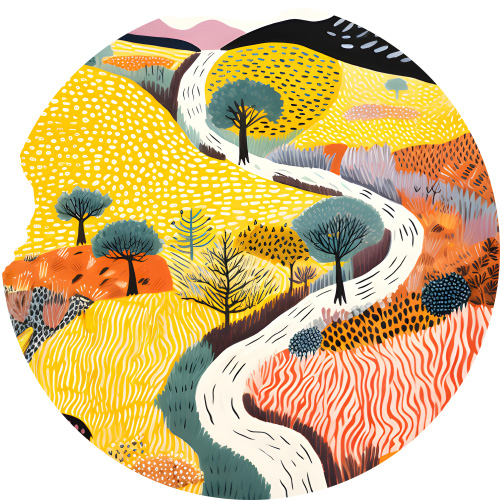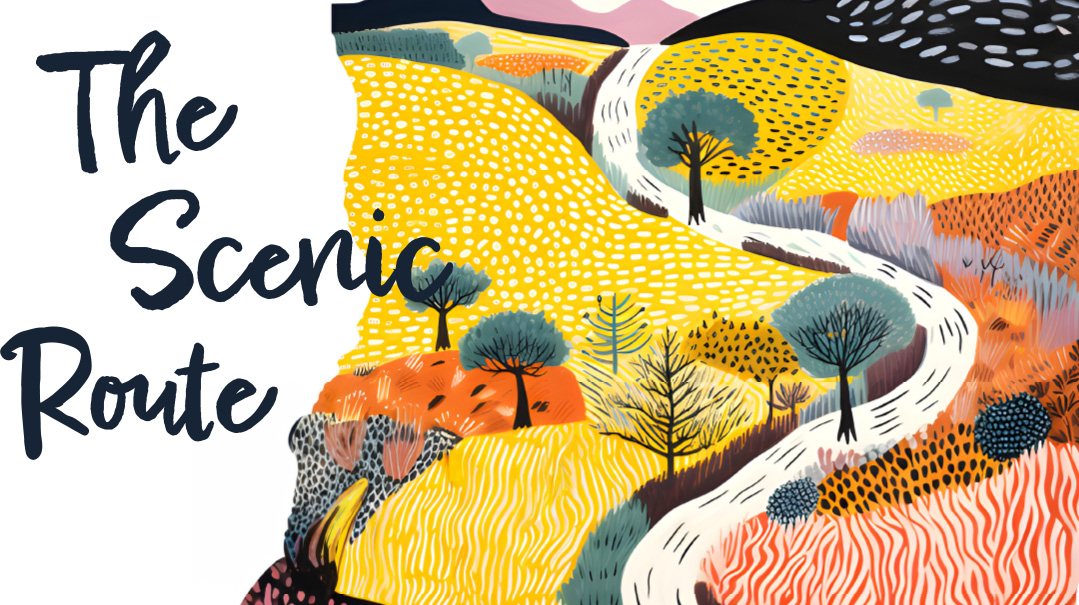The Scenic Route: Chapter 6 of 6
| October 24, 2023I look up at my husband, who is shuckling intently. “Would we do this if we had a baby?”

T
he snow is coming down hard during Lakewood’s once annual snowstorm, and my car skids slightly as I pull over. I fumble for my phone and dial.
“Roizy? Hi… I’m by the corner. I’ll be by you in a minute.”
“Okay, no problem, I’m coming out!”
I’ve never been on this block before, and I squint through the driving snow for Roizy’s address. 915… 917… I’m looking for 921.
Just ahead, the porch light is on, and the familiar form of turban-clad Roizy stands in the entrance, halfway in the frigid outdoors.
I wave through the window, pull over, and hop out of my car without turning it off.
Roizy waves back. I jog up her walkway and up the steps.
“Hi, Chavy!” She hands me a small container. I look down. It’s a Lucite heart filled with red candies, a small injection needle taped to the front.
“It’s an injection of love,” she giggles.
My heart melts, and the anxiety of the last two hours dissipates. “Thanks so much! I needed that.”
“Needed the needle?”
I laugh out loud. “That, too! This cycle depends on it, actually. But the laugh. And the love!”
Roizy giggles again. “I get it,” she says.
And of all people, she does.
At first glance, Roizy and I have little in common. She’s shpitzel-clad Satmar; I’m stereotype yeshivah-area Lakewood.
But she’s been married for seven years, and I’ve been married for six, and we’re both waiting. We met at local Bonei Olam events and at the clinic. And when I realized tonight, long after the pharmacy closed, that I was short an injection needle, I called her.
My sister Tova, who got married three years after I did, is now pregnant with her second. I used to feel bad that she has something to show for her years while I don’t. But my mindset has shifted.
If I had a baby, I’d never know Roizy. I’d never know this moment of love that envelopes two strangers, making soul sisters out of diverse Jewish women.
Hashem can give me a baby — or ten — but He has chosen not to. For now, He has something else in mind, and maybe part of the plan is for me to experience this injection of love from a perfect stranger. Infertility just means I haven’t given birth to a baby. But I’ve given birth to other things: faith, friendship, pain, love, a rock-solid marriage, and sensitivity, to name a few. It’s also given me something else: an acceptance of the life Hashem has designed just for us.
I think of this later that night, when my friend Sari calls.
Her husband is leaving kollel after eight years, and the accounting course he’s taking doesn’t fit the klei kodesh narrative she’d built for herself.
“I know how to support a husband who is learning — I work every day and bend over backward — and I’m so happy. But I don’t want my husband to be working! How am I supposed to be supportive when he comes home from just… work? It’s so dumb!” She heaves a sigh that catches at the end.
I try to say all the right things, but in my mind, I’m miles away.
Sari is my age. She got married straight out of sem, and had four kids in six years. It wasn’t hard for her to accept Hashem’s plan, because it was the same as hers.
Now Hashem is throwing her a curveball, and she’s at a loss. I feel for her as she navigates this challenge. And at the same time, I’m deeply grateful. Grateful that my journey has given me a deep sense of humbleness that Hashem’s plan for me could be vastly different from what I would have chosen, and that’s okay. I’m living my own life at my own pace, and that’s G-dly and liberating.
Without children, Betzalel’s and my schedules are more open. Through a series of connections, Betzalel stumbles upon Marty, a Jewish man in the local nursing home. Marty had no visitors, so we start visiting him on Sundays, keeping him company as he rambles about his life. I believe we are the only ones who have listened to him in his last few years.
“You’re a blessed couple,” Marty says once. “You’re my best friends in the world.”
We visit religiously, until he passes away. Then Betzalel makes several phone calls to ensure that Marty is buried b’kever Yisrael.
One Sunday, a few months after Marty’s petirah, we decide to visit his kever. We felt so close to Marty when he was alive, and we miss our visits. It’s raining lightly when we arrive at the cemetery. I stare at the sad mound of earth, and I find myself suddenly emotional at the side of this near-forgotten Jew.
I look up at my husband, who is shuckling intently. “Would we do this if we had a baby?”
Would we? Would we be so aware of the members of Klal Yisrael who are alone or feel alone on Yamim Tovim or at family simchahs or all year round? Would we be as responsive to their needs?
Infertility is a gift I wouldn’t wish upon anyone. One day — I daven it should be soon — our nisayon will end. But until then — it sounds funny to say — I really wouldn’t want things any other way.
The end
(Originally featured in Family First, Issue 865)
Oops! We could not locate your form.



